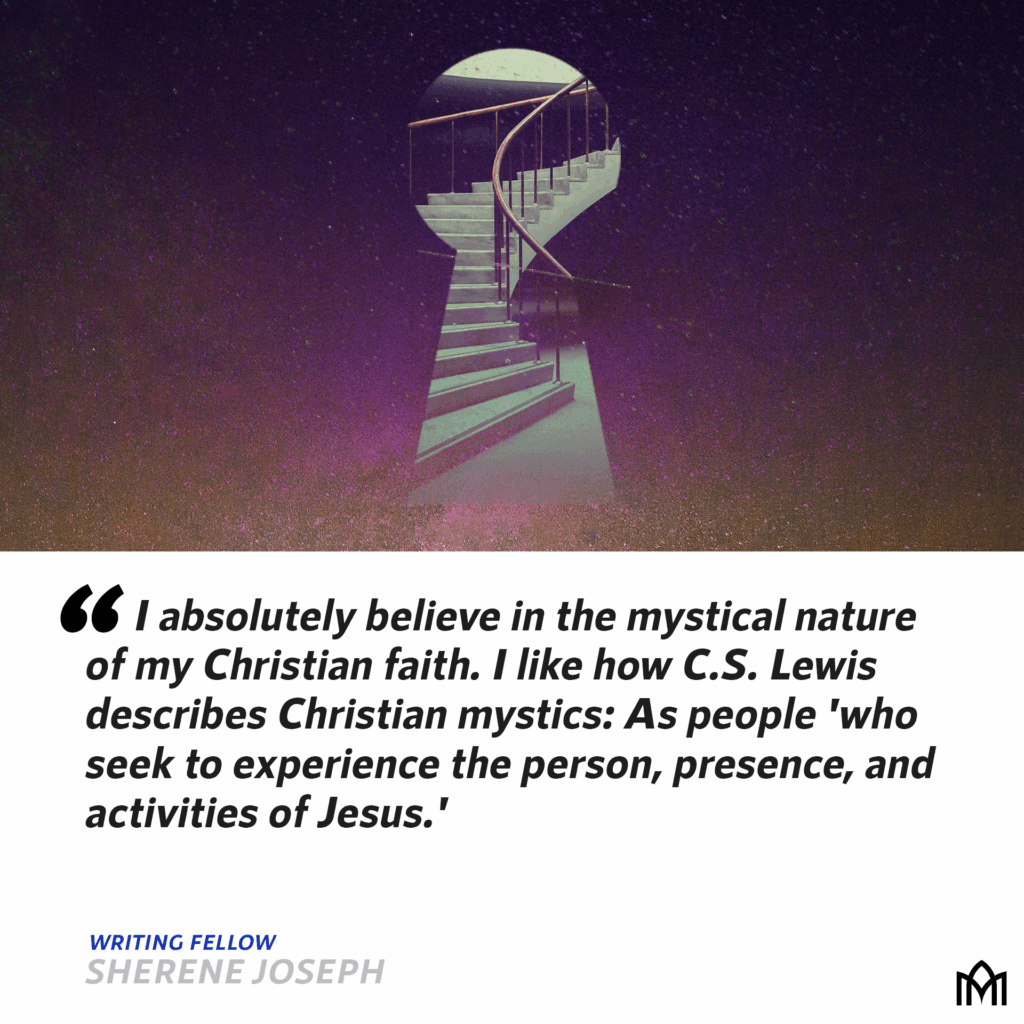An Invitation to Explore the Mystical Heart of God (Pt. 1)
PART 1
My friend Alex recently asked me if trusting in God’s supernatural nature is easy. I was in the middle of a discussion about trusting the power of the Holy Spirit when I realized I needed to provide a quick answer.
But almost instantly, I recognized that there was no simple answer. Discussing the supernatural and mysticism in the Christian faith cannot be done in a few minutes. Even if it could, it’s a challenging concept for the human mind to grasp, contemplate, or believe fully.
So, what exactly is mysticism? And is it something to which we are all called?
Lessons from the Matriarchs
Growing up in India, I was always aware of God’s mystical and supernatural nature, even though many of the churches I attended taught a very Western view of God and theology. The faith of the church matriarchs shaped me profoundly: strong mothers, grandmothers, and aunts who didn’t always have time to study theology, Greek, or Hebrew, or listen to lengthy sermons. What they did have, however, was an undeniable need for God. They longed to spend time in His presence, possessing a childlike faith that believed in the healing power of prayer. These weren’t concepts they could easily articulate into theological statements or principles, but they intuitively knew they could trust God regardless of life’s challenges. Whether times were good or bad, God was in control, and that was enough.
This deep, mystical faith carried me through my childhood and into my college years.
I vividly remember a picture frame next to my Grandma’s bed. It said, “Prayer brings victory.” Grandmother told me that Mother would kneel before it and pray every night. I thought if my mother did that, perhaps I should do it. I never questioned what would happen if prayers went unanswered. If God didn’t want to answer my prayers, He wouldn’t.
The Tension Between Head and Heart
It all seemed so simple back then, but that unquestioning faith did not always stay with me. I grew up, and as I was exposed to the intellectual side of the Christian faith, the sermons, teaching, and academia, my faith was not as childlike as it once had been. I searched for reason, logic, and understanding in every aspect of my Christian journey.
As I faced life’s challenges and struggles, I wondered why a good God would allow a faithful daughter to struggle. The answers I received to my questions in both Eastern and Western churches did not satisfy me.
On one hand, the Eastern church taught me to suffer silently,1I suppose what I am trying to say is – that in the Indian church, suffering is expected as a follower of Christ. We are not taught that the way of Jesus avoids all pain. We are saved by grace and faith alone, but salvation is a gift from a God who is serious about it—confessing and acknowledging our condition as sinners is needed daily. When challenges come our way, we do not immediately question God but are taught to suffer well. The faith community around us reminds us that God will answer in His time; the community rallies around us and holds us up during difficult times. We do not walk alone, at least not in the past generations. Modern generations with more independence want to do things independently, making it hard to suffer well. and on the other, the Western church made it seem like my faith was not sufficient. In the Western church, I needed to pray, read the Bible, have more faith, and never question God. As a result, I railed against God in my head, constantly questioning Him for clarity. I attended Bible studies, took notes during sermons, and prayed fervently, but nothing made sense.
Still, I kept hearing my Grandmother’s words in the back of my head: “Prayer brings victory. Trust in the Lord. Count your blessings.” I wondered if her simple faith was all it took. Why did she never search for more answers? Was faith so simple?
My journey in the Western world, steeped in Western theology, has often led me away from a simple faith. I have embraced a more reason-centric approach. The war between logic and childlike trust is a constant tension inside me. Share on X
A Winding Journey through Western Christianity
By this time, I was well-steeped in the Western church, specifically the American evangelical church. The formats of preaching, teaching, academic, and Christian writing contributed to my growth and understanding. Studying scripture, understanding context and history, and reading commentaries became part of my journey as a Christ follower.
I found myself listening to sermons with an attitude of trying to “catch the preacher out.” If some teaching or comment sounded odd, I would scroll through commentaries or Logos on my phone. It was an attitude of knowing more and constantly critiquing others around me.
Theological knowledge is not wrong. We need it to understand the Scriptural narrative from Genesis to Revelation. However, knowing the stories alone is not sufficient. Understanding context, historical perspectives, culture, and much more is necessary to see how Scripture actually applies to our real lives.
But sometimes, we can become so steeped in theology that it can actually become detrimental to our faith.
My journey in the Western world, steeped in Western theology, has often led me away from a simple faith. I’ve grappled with questions, doubt, and the quest for logic within my belief system. From an emotional, gut-level faith, I have embraced a more reason-centric approach. Because of this, the war between logic and childlike trust is a constant tension inside me.
I absolutely believe in the mystical nature of my Christian faith. I like how C.S. Lewis describes Christian mystics: As people 'who seek to experience the person, presence, and activities of Jesus.' Share on X
Rediscovering the Mystical
Grappling with this tension, I return to my friend’s question: Is trusting in God’s supernatural nature easy? Was there a mystical element to faith? What did the early church fathers and mothers believe in? They had no Bible, no books on theology. All they had was the supernatural nature of God. His presence was in the fire, water, and wind. His still, small voice spoke in the quiet of one’s heart. They saw miracles. What would I do today if I saw an ocean part in two, a flame or earthquakes consuming people, lepers being healed, and water turning into blood or wine?
It was illuminating to me that the Eastern (Orthodox) church is not the only stream of faith that believes in God’s mystical nature. For centuries, followers of Christ have believed in a mystical faith. Celtic Christians (Irish and Scottish followers of Christ) often called themselves “Peregrinari Pro Cristo” (Exiles for Christ). This illumines one of their core understandings: “Life is a journey, a spiritual and actual pilgrimage.”2Quote accessed from https://www.culturehoney.com/peregrinatio-pilgrimage-celtic-style/.
However, the term Christian mystic is often confusing and makes people wary. We all use different terms to describe our Christian faith. More often than not, we hear the term “Bible-believing follower of Christ.” Or we use denominations that remind us and others of which group we belong to.
I grew up in a non-denominational church in the Middle East. During high school, my parents moved to a Pentecostal church and then to a Protestant Church. In college, I attended the Church of South India (An amalgamation of Presbyterian, Reformed, Anglican, and Methodist) and am familiar with worship in the Assemblies of God.
When I moved to the United States, I was introduced to Baptists, Lutherans, and, of course, the non-denominational American Bible churches. This led me to my journey into Christian academia and theological education. My faith journey can be compared to a potluck or a stir fry, as it blends many traditions, forms of worship, and doctrine.
But the one thing that has remained constant over the years is the mystery involved in my faith. If my “life is a journey, a spiritual and actual pilgrimage,” I believe there will always be seasons when I do not understand, but I have to trust and believe.
I absolutely believe in the mystical nature of my Christian faith. I like how C.S. Lewis describes Christian mystics: As people “who seek to experience the person, presence, and activities of Jesus.” Lewis defined Christian mysticism in this compelling way:
“[Christian mysticism is] the direct experience of God, immediate as a taste or colour. Discovering spirituality is like discovering you are in a boat. Mysticism is like pushing off from the dock… not to be done in a cavalier fashion.. The issue is not of whether we should push off, for Christians must do so if they intend to get anywhere, but rather of where you are going…The Christian casts off from this world with clear intent to where he is headed, with the best of maps, circumspectly, deliberately. The Christian Mystic arrives against all dangers and odds. Thus, we launch out with fear and trembling, but trust that He who commanded us to do so can calm the waves and see us through to His real, safe port” (C.S. Lewis, Untitled lecture).
I have never been a sailor or spent much time on a boat. Despite all the modern inventions that help keep ships safe, casting off from the shore can be unsettling for many. But for those who love to sail, they set off with trust that they will come home safe.
Our walk with Christ can often make no sense. But Jesus calls us to step out towards Him on the water and walk towards Him.
As Isaiah writes, “For my thoughts are not your thoughts, neither are your ways my ways, declares the Lord. As the heavens are higher than the earth, so are my ways higher than your ways and my thoughts than your thoughts” (Isaiah 55:8-9). In Ecclesiastes 11:5, we read: “As you do not know the path of the wind, or how the body is formed in a mother’s womb, so you cannot understand the work of God, the Maker of all things.”
These texts tell me that God is real and always present with us. We need only seek God’s presence in our daily lives. My thoughts, which I consider lofty and certain, are nothing compared to His mysterious ways. I do not know how the wind blows, or the flowers bloom, but God does. This reality is a mystery, and I don’t understand it all, but the God of all reality invites me to enter into this mystery with abiding trust.
And so I do.
///
I do not know how the wind blows, or the flowers bloom, but God does. This reality is a mystery, and I don't understand it all, but the God of all reality invites me to enter into this mystery with abiding trust. Share on X
*Editorial Note: The conclusion of Sherene’s piece, “An Invitation to Explore the Mystical Heart of God (Pt. 2),” will post tomorrow, Wednesday, April 23rd. Sherene’s first piece for Missio Alliance as a 2024 Writing Fellow was entitled Spiritual Formation in My Mundane (Actual) Life. ~CK




